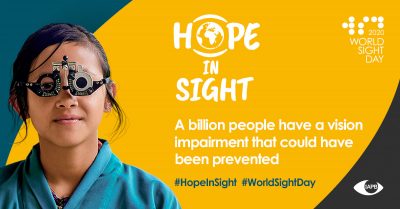World Sight Day is an annual day in October held to raise awareness on of visual impairment and blindness. This year’s theme is “Hope in Sight”.
Around the globe at least 1 billion people have a vision impairment that could have been prevented or has yet to be treated. Although the majority of people with vision impairment and blindness are over the age of 50 years, in the countries which have higher level of poverty, children are more likely to suffer from sight problems at a young age.
There are different levels of sight impairment and the effect they have on people’s lives.
Severely sight impaired
Defined as having central visual acuity of less than 3/60 (i.e. unable to see at 3 metres what a normally sighted person sees at 60 metres) with normal fields of vision or large visual field restriction.
Sight impaired
Able to see at 3 metres what the normally sighted person sees at 60 metres, but not at 6 metres.
Low vision
A visual acuity of less than 6/18 but greater than 3/60. Not eligible to drive and may have difficulty recognising faces across a street, watching television, or choosing clean unstained co-ordinated clothing.
The common causes of vision impairment are:
- uncorrected refractive errors
- cataract
- age-related macular degeneration
- glaucoma
- diabetic retinopathy
- corneal opacity
- trachoma
However, this varies from country to country. For example, in high income countries, diseases such as diabetic retinopathy, glaucoma and age-related macular degeneration are more common. Whereas in low and middle income countries visual impairment is often due to cataracts.
The steps you can take to prevent blindness or visual impairment
- Seek regular eye care as early diagnosis and treatment are essential for preventing avoidable blindness
- Be aware of vision problems in the family as many preventable vision problems are genetically linked
- Eat a nutritious and balanced diet with regular exercise. This can help manage blood sugar levels to reduce the risk for diabetic retinopathy and reduce blood pressure to prevent glaucoma
- Take prescribed medications such as glaucoma eye drops and insulin
- Quit smoking and reduce alcohol intake as smoking and excessive use of alcohol both increases the risk of cataracts and other eye problems
If you have any concerns about your sight the please call us to book an appointment on 01628 663055
#HopeInSight #WorldSightDay

